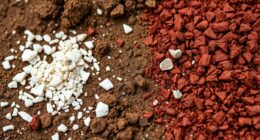Overusing nitrogen fertilizer can harm your environment by contaminating groundwater with dangerous nitrates, which pose health risks like blue baby syndrome. It also degrades soil health by causing acidification and reducing its fertility, making crops less productive over time. Additionally, excess nitrogen releases greenhouse gases like nitrous oxide, which contribute to climate change. If you want to understand how to minimize these impacts and protect ecosystems, there’s more to discover.
Key Takeaways
- Overuse of nitrogen fertilizer causes soil acidification, reducing beneficial microbes and nutrient availability for plants.
- Excess nitrogen leaches into groundwater, posing health risks like methemoglobinemia and harming aquatic ecosystems.
- Nitrogen overapplication releases nitrous oxide, a potent greenhouse gas contributing to global warming.
- Runoff from excess fertilizer promotes harmful algal blooms, oxygen depletion, and marine life death.
- Long-term overuse degrades soil health and reduces land productivity, threatening sustainable agriculture.

Overusing nitrogen fertilizer can considerably harm the environment, leading to a range of ecological problems. One major issue is soil acidification, which occurs when excess nitrogen alters the natural pH balance of the soil. As you apply too much fertilizer, it releases nitrates and other acidic compounds that gradually lower soil pH. This makes the soil less hospitable for beneficial microbes, reduces nutrient availability, and hampers plant growth over time. As the soil becomes more acidic, it can also lead to the breakdown of essential minerals, further degrading soil health and productivity. You might notice poorer crop yields and increased reliance on additional inputs to compensate for the declining soil quality.
Overusing nitrogen fertilizer harms soil health, reduces crop yields, and increases environmental risks.
Another critical concern linked to nitrogen overuse is groundwater contamination. When you apply more fertilizer than plants can absorb, the surplus nitrates don’t just stay in the soil; they leach downward with water movement. This excess nitrogen moves through the soil profile and eventually reaches groundwater supplies, which many communities rely on for drinking water. Elevated nitrate levels in groundwater pose serious health risks, especially for infants and pregnant women, as they can cause conditions like methemoglobinemia, or “blue baby syndrome.” The contamination also disrupts aquatic ecosystems when these nitrates eventually run off into rivers, lakes, or coastal waters, triggering harmful algal blooms that deplete oxygen and kill marine life.
The environmental consequences of over-fertilization extend beyond soil and water. The release of excess nitrogen into the atmosphere as nitrous oxide, a potent greenhouse gas, accelerates climate change. This gas traps heat more effectively than carbon dioxide, contributing to global warming. Additionally, the nitrogen cycle gets thrown out of balance, which can lead to increased smog formation and respiratory issues in nearby communities due to higher emissions of nitrogen oxides. Proper fertilizer management practices, such as precision application and crop rotation, are essential to minimize these adverse effects.
You may not always see these impacts immediately, but the long-term effects of overusing nitrogen fertilizer are clear. Soil becomes less resilient, groundwater quality declines, and ecosystems suffer from nutrient overload. Managing fertilizer application carefully helps prevent these problems, preserving soil health, protecting water resources, and reducing your overall environmental footprint. It’s vital to adopt sustainable practices, such as precision fertilization and crop rotation, to minimize excess nitrogen use and safeguard the environment for future generations.
Frequently Asked Questions
How Does Nitrogen Overuse Affect Soil Microbial Diversity?
When you overuse nitrogen fertilizer, it disrupts soil health by reducing microbial diversity. Excess nitrogen favors certain microbes, like nitrifiers, while suppressing others, upsetting the microbial balance. This imbalance weakens soil resilience and hampers nutrient cycling. As a result, your soil becomes less productive over time, making it harder for plants to grow. To maintain a healthy, balanced soil, it’s vital to manage nitrogen applications wisely.
What Are the Long-Term Economic Costs of Nitrogen Fertilizer Overapplication?
Overapplying nitrogen fertilizer can lead to significant long-term economic costs, threatening your farm’s economic sustainability. You might face reduced crop yields as soil health declines, increased expenses for soil remediation, and potential penalties from stricter policy implications aimed at reducing environmental damage. These costs can accumulate over time, making it crucial for you to adopt sustainable practices now to ensure long-term profitability and compliance with evolving regulations.
Can Organic Farming Methods Mitigate Nitrogen Pollution?
Yes, organic farming methods can mitigate nitrogen pollution by using organic alternatives like compost and cover crops, which release nutrients slowly and improve soil health. These practices reduce excess nitrogen runoff and leaching, helping protect water quality. By focusing on soil health, you create a balanced ecosystem that naturally regulates nutrient levels, decreasing the need for synthetic fertilizers and minimizing environmental impacts associated with nitrogen overapplication.
How Does Nitrogen Runoff Influence Marine Ecosystems?
When nitrogen runoff enters marine ecosystems, you cause algal blooms that thrive on excess nutrients. These blooms block sunlight, harming underwater plants and disrupting marine life. Coastal eutrophication results, leading to dead zones where oxygen levels plummet, killing fish and other organisms. Your actions contribute to this cycle, emphasizing the importance of managing nitrogen sources to protect marine biodiversity and maintain healthy ocean environments.
Are There Emerging Technologies to Reduce Nitrogen Fertilizer Dependency?
You’re curious if new tech can cut down fertilizer use. Yes, emerging solutions like precision agriculture and crop biotechnology are leading the charge. Precision agriculture uses sensors and data to optimize fertilizer application, reducing waste. Meanwhile, crop biotech develops plants that fix nitrogen naturally or need less input. These innovations could revolutionize farming, making it smarter and more sustainable—don’t you want to see a future where farming harms the environment less?
Conclusion
You might think that using more nitrogen fertilizer boosts your crop yields, but overdoing it harms the environment. Excess nitrogen leaches into water sources, creating dead zones and contaminating drinking supplies. It also releases greenhouse gases, speeding up climate change. Some say nature can handle it, but evidence shows overuse disrupts ecosystems and health. So, consider smarter fertilizing practices—your choices can safeguard the planet and ensure sustainable farming for future generations.









